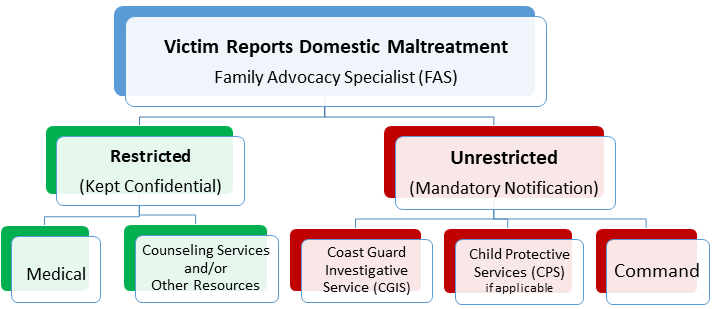Family Advocacy Specialist (FAS)

Kristen Hutchenson
206-217-6608
Kristen.S.Hutchenson@uscg.mil
The FAS possesses in-depth knowledge about the dynamics of family and abuse by representing various human service disciplines, to the maintenance of stable family life in the Coast Guard. The FAS manages all family advocacy cases to ensure proper involvement, referrals, services, and follow-ups to assist commands and families. Information regarding incidents of family violence reported within the Coast Guard are kept confidential (with the exception of mandatory reporting requirements) and are not made a part of the member's service record.

Restricted Report:
A report of an incident of intimate partner maltreatment made by an adult victim who requests FAP and/or medical services while also requesting that the maltreatment not be reported to the Coast Guard Investigative Service, the Incident Determination Committee, or the alleged offender’s or victim’s command. In the Coast Guard, requests for restricted reporting can be received by a Coast Guard healthcare provider, a FAS, or other HSWL Regional Practice staff member when performing FAS duties.
Unrestricted Report:
A report of an incident of intimate partner maltreatment by any person, including an adult victim, that uses current reporting channels, e.g., the chain of command, military or civilian law enforcement, or military criminal investigative organization, and the FAP for intervention.
WHAT WE DO
•Assist commands to help service members and families involved
•Support and protect the rights of victims and offenders
•Retain service members in their Coast Guard careers
•Prevent and reduce incidents of abuse through identification of trends, intervention and education.
•Coordinate services for members and families
•Support members and families through the pain and fear to a healthy resolution.
The Family Advocacy Program is a Congressionally-mandated (Chapter 10 United States Code Section 1058) program that addresses prevention, identification, reporting, investigation, and treatment of intimate partner and child maltreatment and assigns responsibilities for a coordinated community response within the Coast Guard in collaboration with services outside the Coast Guard.
Program Confidentiality
All discussions between a person using the Family in Need of Services program under the Family Advocacy Program and the Family Advocacy Specialist are strictly confidential. Discussions between a person using Family Advocacy Program maltreatment services, where the person has not qualified for the restricted reporting option, are confidential with the following exceptions:
1.The Family Advocacy Specialist is required to report all unrestricted cases of abuse to Coast Guard Investigative Service.
2.The Family Advocacy Specialist is required to notify all involved active duty members’ commands. Normally the information shared is limited to alleged incident details, the assessed risk for future incidents, and recommendations for protection and alleged offender treatment.
3.Restricted reports are not allowed for cases of child maltreatment and must be reported to the state agency responsible for investigating such reports.
4.All discussions between a victim of intimate partner maltreatment who has been provided the restricted reporting option and the Family Advocacy Specialist are strictly confidential as long as the victim or other involved persons are not in imminent danger of serious harm.
Definitions
The following definitions apply to the Family Advocacy Program:
Alleged Offender:
An individual who reportedly physically or sexually abused, emotionally maltreated, or neglected his or her child, a current or former spouse, intimate partner with whom the individual has shared a domicile, a domestic partner of a military member, or an intrafamilial or extrafamilial caregiver who allegedly physically or sexually abused, emotionally mal-treated, or neglected a child in his or her care.
Child Protective Services (CPS):
A generic term used for the agency charged by statute to investigate allegations of child abuse and neglect. Reports can be made to the appropriate CPS agency by calling the National Child Abuse Hotline at 1-800-4-A-CHILD.
Family Advocacy Specialist (FAS):
The staff member at Health, Safety, and Work-Life Regional Practices specifically trained to assist individuals and commands when maltreatment incidents occur.
Family In Need of Services (FINS):
FINS is a category of FAP services for those cases in which there was a reasonable suspicion of maltreatment that was later determined to not meet the criteria for maltreatment but the persons involved request continued services. FINS clients may also include individuals and families who are impacted by other types of abuse that are not reviewed by the Incident Determination Committee, including elder, sibling, and out-of-home abuse. These services can include individual, marital, or family therapy, anger management groups, other forms of counseling/education related to family issues, and information and referral services. Note: FINS cases are strictly confidential and information about them is not shared without the expressed permission of the clients involved.
Incident Determination Committee (IDC):
A Coast Guard team of designated individuals tasked with the evaluation of reports of child and intimate partner maltreatment to determine whether they meet the relevant DoD/Coast Guard research-based criteria for the type of maltreatment alleged. Each IDC is the responsibility of the commanding officer of the Coast Guard base or other command to whom the Health, Safety, and Work-Life Regional Manager reports.
Maltreatment:
A generic term used to include all forms of child and intimate partner abuse and neglect. The 8 types of mal-treatment incidents that are reportable to the FAP Incident Determination Committee include: physical, sexual, and emotional child abuse; child neglect; intimate partner physical, sexual, and emotional abuse; and neglect of spouse. Maltreatment as defined here is not meant to encompass conduct defined for the same term in the Manual for Courts-Martial, United States (2012 edition).
Victim:
A child who is the subject of an alleged incident of child abuse, or a person who is the subject of an alleged incident of intimate partner maltreatment by a person who is the current or former spouse or with whom the alleged abuser shares a child in common, or is a current or former intimate partner with whom the alleged abuser shares or has shared a common domicile, or is a domestic partner of a military service member.